I have two threads that increase the CPU overhead. 1. Reading from the socket in a synchronous way. 2. Waiting to accept connections from other clients
Problem 1, I'm just trying to read any data that comes from the client, and I can not use readline, because the incoming data has newlines that I mark for knowing the header end of a message. So I'm using that way in a thread, but it increases the CPU overhead
public static String convertStreamToString(TCPServerConnectionListner socket) throws UnsupportedEncodingException, IOException, InterruptedException {
BufferedReader reader = new BufferedReader(new InputStreamReader(socket.getSocket().getInputStream()));
// At this point it is too early to read. So it most likely return false
System.out.println("Buffer Reader ready? " + reader.ready());
// StringBuilder to hold the response
StringBuilder sb = new StringBuilder();
// Indicator to show if we have started to receive data or not
boolean dataStreamStarted = false;
// How many times we went to sleep waiting for data
int sleepCounter = 0;
// How many times (max) we will sleep before bailing out
int sleepMaxCounter = 5;
// Sleep max counter after data started
int sleepMaxDataCounter = 50;
// How long to sleep for each cycle
int sleepTime = 5;
// Start time
long startTime = System.currentTimeMillis();
// This is a tight loop. Not sure what it will do to CPU
while (true) {
if (reader.ready()) {
sb.append((char) reader.read());
// Once started we do not expect server to stop in the middle and restart
dataStreamStarted = true;
} else {
Thread.sleep(sleepTime);
if (dataStreamStarted && (sleepCounter >= sleepMaxDataCounter)) {
System.out.println("Reached max sleep time of " + (sleepMaxDataCounter * sleepTime) + " ms after data started");
break;
} else {
if (sleepCounter >= sleepMaxCounter) {
System.out.println("Reached max sleep time of " + (sleepMaxCounter * sleepTime) + " ms. Bailing out");
// Reached max timeout waiting for data. Bail..
break;
}
}
sleepCounter++;
}
}
long endTime = System.currentTimeMillis();
System.out.println(sb.toString());
System.out.println("Time " + (endTime - startTime));
return sb.toString();
}
Problem 2, I don't know what is the best way for doing that, I'm just having a thread that constantly wait for other clients, and accept it. But this also takes a lot of CPU overhead.
// Listner to accept any client connection
@Override
public void run() {
while (true) {
try {
mutex.acquire();
if (!welcomeSocket.isClosed()) {
connectionSocket = welcomeSocket.accept();
// Thread.sleep(5);
}
} catch (IOException ex) {
Logger.getLogger(TCPServerConnectionListner.class.getName()).log(Level.SEVERE, null, ex);
} catch (InterruptedException ex) {
Logger.getLogger(TCPServerConnectionListner.class.getName()).log(Level.SEVERE, null, ex);
}
finally
{
mutex.release();
}
}
}
}
A Profiler Picture would also help, but I'm wondering why the SwingWorker Thread Takes that much time?

Update Code For Problem One:
public static String convertStreamToString(TCPServerConnectionListner socket) throws UnsupportedEncodingException, IOException, InterruptedException {
byte[] resultBuff = new byte[0];
byte[] buff = new byte[65534];
int k = -1;
k = socket.getSocket().getInputStream().read(buff, 0, buff.length);
byte[] tbuff = new byte[resultBuff.length + k]; // temp buffer size = bytes already read + bytes last read
System.arraycopy(resultBuff, 0, tbuff, 0, resultBuff.length); // copy previous bytes
System.arraycopy(buff, 0, tbuff, resultBuff.length, k); // copy current lot
resultBuff = tbuff; // call the temp buffer as your result buff
return new String(resultBuff);
}
}
![snapshot][2]